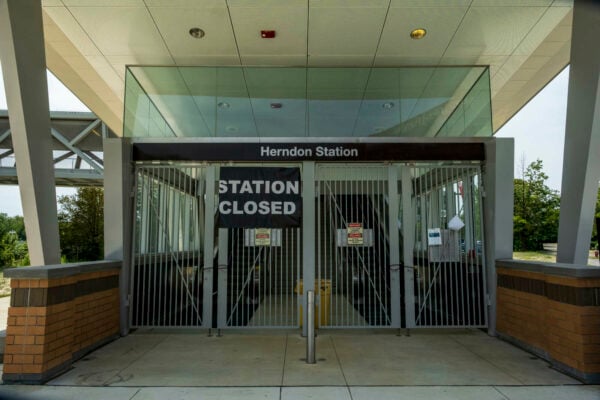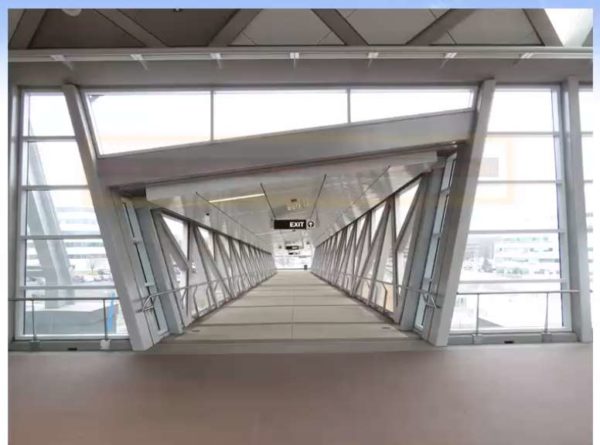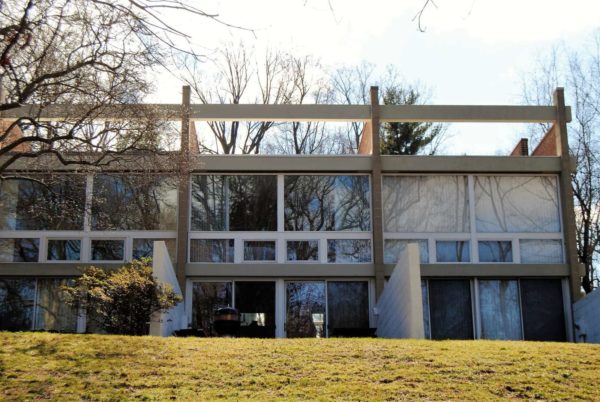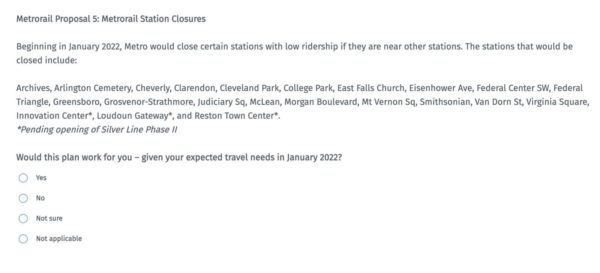The Metropolitan Washington Airports Authority (MWAA) will not meet its Labor Day deadline for substantial completion of Silver Line Phase 2, likely pushing back the opening of the long-delayed $2.8 billion project yet again.
The announcement came in the final minutes of the Fairfax County Board of Supervisors’ transportation committee meeting earlier this week.
The delay is related to the work done this past weekend (June 26-27) to tie together the Silver Line’s second phase with the operating first phase at Wiehle-Reston East Metro station, forcing the station to close.
“We were made aware that the tie-in between Phase 1 and Phase 2, which was partially done this weekend, will actually need an additional weekend,” Martha Elena Coello, special projects division chief for the Fairfax County Department of Transportation, told the committee.
She noted that this was different information than what was in the presentation that had been prepared for the meeting.
“That will impact the substantial completion day of Labor Day and the magnitude of that impact has not been determined yet,” she said. “We expect to have that information within two weeks.”
An MWAA spokesperson confirmed that this is the case.
While MWAA told Reston Now last week that an additional weekend and a second shutdown of the Wiehle-Reston East Metro station will be needed to complete the work, it wasn’t clear how it would affect the timeline of the entire project.
Now, it’s clear that MWAA will not be handing over the project to the Washington Metropolitan Area Transit Authority (WMATA) by Labor Day weekend, which is only eight weeks from now. At this point, it is unknown when completion and hand-off could take place.
Metro needs about six months from substantial completion to complete testing and open the system, according to the presentation to the county board’s transportation committee.
With a Labor Day hand-off, Silver Line Phase 2 could reasonably be assumed to open in early March 2022. Now, the operating date could be pushed further into spring or even later.
When asked what work was completed last weekend and what still needs to be done, MWAA spokesperson Marcia McAllister told Reston Now by email that it was mostly electrical tasks:
This past weekend, the connection of the Traction Power system between Phase 2 of the Silver Line and the existing Metrorail system was successfully completed at the Wiehle-Reston East Metrorail Station. In addition, work was done to connect the Automatic Train Control System (ATC).The work was done by crews from Capital Rail Construction (CRC) and the Washington Metropolitan Area Transit Authority (WMATA) working closely together. The Airports Authority is now reviewing the work that remains to be done at the ATC tie-in prior to completion of the rail line and is assessing any schedule impacts.
She added in a follow-up that additional work still needs to be done, but a date has not been set for the next outage and shutdown of the Wiehle-Reston East Metro station.
Overall, Phase 2 is 99% completed, but even beyond the tie-in, there remains work still to be done around third-rail insulators, station platform pavings, and more.
However, Coello noted at the meeting that a majority of this work needs to be completed by revenue service and can be done after MWAA’s handoff to WMATA.
This is far from the first delay to beset the Silver Line’s second phase, which was initially set to be completed in 2018. The project will extend Metro from Reston into Loudoun County with six new stations.
The timeline has been prolonged by contractor issues, design changes, flawed materials, defective panels, and bad concrete, testing the patience and viability of a number of local Reston and Herndon businesses that intentionally set up shop near the stations.
Now, businesses, residents, and the region are going to have to wait at least a little bit longer for Silver Line Phase 2 to finally open.
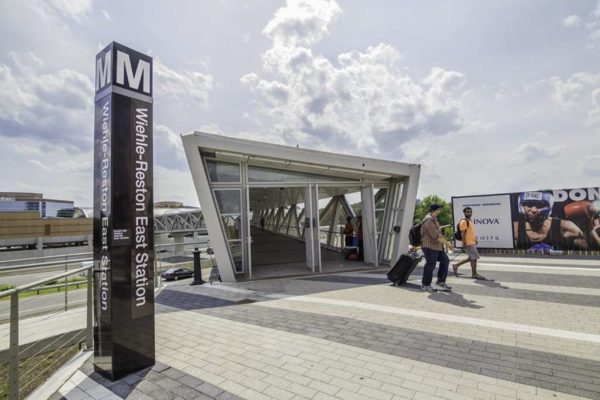
(Updated at 3:30 p.m.) The Wiehle-Reston East Metro station will be closed this weekend (June 25-26) so workers can connect the first and second phases of the Silver Line.
Most of the work being done this weekend is electrical and technological, as opposed to construction, says Marcia McAllister, spokesperson for the Metropolitan Washington Airports Authority.
“The work to be done this week by MWAA and CRC (our contractor) will make the permanent power connections between Phase 2 and the existing WMATA system,” wrote McAllister in an email to Reston Now. “This connection is at the Wiehle-Reston station which is the current end of the Silver Line.”
Additional testing will also be done this weekend.
Metro will provide free shuttle buses throughout the weekend to transport passengers between Wiehle-Reston East and the Spring Hill station in Tysons, the closest stop on the Silver Line, MWAA says.
The Washington Metropolitan Area Transit Authority has called the task of connecting the two phases of its Silver Line rail a major benchmark and potential challenge of the project.
McAllister noted that this closure is an expected part of the process as MWAA prepares to hand over the project to WMATA in September.
Another outage — meaning potential additional closures — will be needed prior to that fall turnover, writes McAllister, but a date for that has yet to be determined.
“At this time, this weekend’s shutdown at Wiehle-Reston East is the only closure scheduled during the next 8 weeks with regard to Silver Line Phase 2,” Metro spokesperson Sherri Ly told Reston Now.
Silver Line Phase 2 appears to be still on track to open in the first quarter of 2022, though officials previously cautioned that the timeline is subject to change.
The long-delayed $2.8 billion project originally had a completion date of 2018. But design changes, defective panels, contractor issues, flawed rail ties, and bad concrete all contributed to the nearly four-year delay, which has tested the patience of some local businesses in Herndon and Reston.
New images show what future residents and visitors can expect from a $1.4 billion project near a forthcoming Reston Town Center Metro station.
As first reported by the Washington Business Journal, developer Brookfield Properties has released more details on the upscale housing coming to the Halley Rise residential, office, and retail complex under construction along Reston Parkway.
Preleasing for apartments in The Edmund — a seven-story apartment building with 353 luxury units — is slated to begin this summer before residents are welcomed in the fall, the developer tells Reston Now.
“As we meet this next major milestone, we’re a step closer to creating a visionary neighborhood that blends nature, technology, entertainment, and art, enabling residents, workers and visitors to curate their ideal day every day, in a vibrant and engaging community,” Greg Meyer, executive vice president and head of the D.C. region for Brookfield Properties, said in a statement.
The Edmund will feature common areas and outdoor seating as well as a pool, fitness center, coworking space, yoga lawn, and more. An interactive virtual tour offers a glimpse of one of the 1,600 units expected at the 36-acre mixed-used campus.
The luxury apartments will include mostly one-bedroom apartments, with 17% of the units being studios, 17% two bedrooms, and 3% three bedrooms, Brookfield Properties U.S. communications director Laura Montross said in an email.
Rental details are not yet listed with the developer’s website.
When completed, Halley Rise will have 1.9 million square feet of office space (about five and a half times the size of the Lincoln Memorial Reflecting Pool), 240,000 square feet of retail (just over four football fields), over five acres of public open space, and new public streets.
The development will be anchored by a Wegmans grocery store slated to arrive in 2023, slightly later than the late 2022 timeline that Reston Now last reported.
Real estate developer Akridge is looking to add 480 residential units and retail as part of the complex. That addition is currently scheduled to go before the Fairfax County Planning Commission for approval on Dec. 8.
Construction for Halley Rise began in October 2019, and it’s already showing off one of its amenities: self-driving vehicles within the complex. The service has also expanded in the DC region.
Halley Rise is one of several developments in the works in anticipation of the second phase of Metro’s Silver Line. Also near the impending Reston Town Center station, Boston Properties is working on the massive Reston Gateway project, which is undergoing some changes that were set to go before the Board of Supervisors today (Tuesday).
The board’s meeting package indicates that it will defer the public hearing on that application until July 13.
Paul Olsen opened a second location of Weird Brothers Coffee at Worldgate Metro Plaza in October 2019.
The shopping center on Worldgate Drive was specifically marketed and named in anticipation of the Herndon Metro Station opening less than a quarter of a mile away as part of the Silver Line’s second phase.
Two years later, the Herndon station and the other Silver Line Phase II stops still won’t be operational for at least another eight months.
“At the time, we weren’t even considering expansion,” Olsen tells Reston Now. “We saw the Metro and…figured this is a great situation. But, then, obviously things changed. COVID hit a few months later. Then, we saw more Metro line delays.”
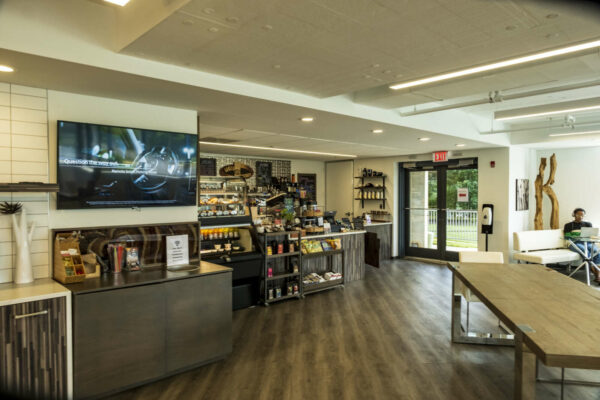
Olsen’s situation isn’t unique. Many businesses specifically set up shop near a future Silver Line Phase II Metro station thinking it would provide a boost, only for Metro’s opening to be continuously delayed.
“We initially thought that the Metro would open, at the latest, early 2020,” said Don Lee, co-owner of Alo Vietnam Restaurant in Herndon.
The restaurant is about a five-minute walk from the not-yet-opened Innovation Center Metro station. Alo Vietnam is also expected to start a location in Reston at Faraday Park.
“We did invest in 2019…thinking that we will carry the load the first year until the Metro opens,” Lee said. “Then, we will have a good location with a lot of foot traffic with tourists and from all the businesses around.”
Seven years ago this July, the most expensive transportation project in the D.C. region’s history began operations. The opening of the Silver Line and its five new stops brought Metro into Tysons and up to the Wiehle-Reston East station.
However, the intention was always to extend the transit system further into D.C.’s growing Northern Virginia suburbs. Construction on five additional stations, including one at Reston Town Center and two in Herndon, began even before Phase I opened and originally had a completion date of 2018.
However, issues proliferated, from design changes and defective panels to flawed rail ties and bad concrete. Soon, the opening got pushed to early 2020, but the problems kept coming and coming. Read More
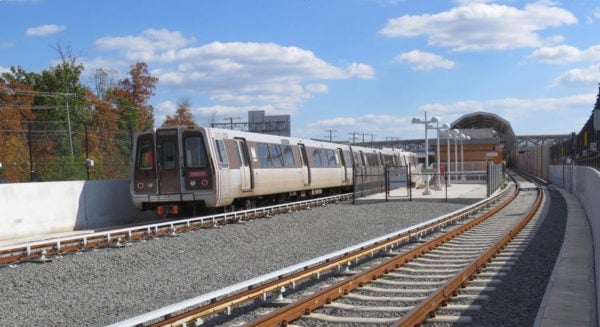
Metro service changes announced last week — including increased services, late night hours, and reduced fares — are being praised by many in the community.
On Thursday (June 10), the Metro Board approved a host of improvements with the intention of luring back riders after more than a year of reduced services and free-falling ridership.
The changes include more frequent service during both peak and non-peak times, extending operating hours until 1 a.m. on weekends, a flat $2 weekend rate, and free transfers between bus and rail.
The changes will take effect starting Labor Day weekend, the traditional end of the summer.
“These are all very positive changes,” Hunter Mill District Supervisor Walter Alcorn told Reston Now. “The only thing that made these service improvements possible is the money from our federal partners. Because Congress stepped up and delivered, we’re able to make these service improvements and, frankly, do what needs to be done to help build back ridership.”
Metro received nearly $723 million in federal COVID-19 relief funds, including $193 million from the American Rescue Plan enacted in March. These funds not only prevented severe cuts, but allowed Metro to increase services while cutting fares.
Local labor unions are also pleased with the changes, including ATU Local 689, which represents more than 10,000 regional transit workers and said it “strongly supports” the service increases.
“We know that public transit is a safe and effective way for riders to get where they need to go, but we have to do the work to rebuild rider confidence,” ATU Local 689 President Raymond Jackson wrote in an email to Reston Now. “The first step to this is making sure that passengers know there will always be a bus or train there for them when they need it. That requires full service. We’re proud that WMATA took this step.”
Alcorn says that, during the pandemic, cuts to service were a “significant hardship” for those who couldn’t work from home, like hospitality workers, who often need rail and bus service at different times than those in other industries.
“We realized that, in the middle of the pandemic, that there’s still a lot of folks that depend on transit to get to work and to do what they need to do to get around,” Alcorn said.
John Boardman is executive secretary and treasurer for Local 25, a union that represents about 7,000 people who work in hotels, casinos, and restaurants in the D.C. metro region. He says expanding services is inherently beneficial to their members.
“Our jobs are not 9 to 5 jobs. They start early in the morning and can go late into night,” Boardman said. “More transportation and longer hours helps our workforce. Reliable transportation is one of the issues that affects people’s ability to get back to work.”
Increased service and fare cuts will also greatly benefit those most vulnerable in the community, such as the clients the D.C. Reentry Action Network, a regional organization that assists people being released from prison.
“Any reduction in the cost of transportation would contribute greatly to reducing the already tremendous hurdles one faces when returning home,” founder Paula Thompson told The Washington Post.
Metro admits it could still take years for ridership to return to pre-pandemic levels. A graph presented at the transit agency’s June 10 board of directors meeting estimates that even by the end of 2024, ridership may still be off by as much as 25% from late 2019 levels.
But it’s hoped that these changes could at least spur gradual growth. Read More
Silver Line Phase 2 remains on track to open in the first quarter of 2022, the Metropolitan Washington Airport Authority says.
In an update on the Dulles Corridor Metrorail Project issued on Monday (May 17), the agency says it is “confident” that construction will be finished “around Labor Day,” at which point the long-delayed $2.8 billion project will finally be handed off to the Washington Metropolitan Area Transit Authority.
If that happens as planned, WMATA will begin conducting “operational readiness testing.” That step includes more inspections, trainings, delivery of spare parts, certifications, and the correction of any issues.
That process should take two months if there are no outstanding issues, according to a Metro presentation on Silver Line Phase 2’s progress from March.
After that, there will be “pre-revenue activities,” including more trainings, testings, and the issuing of safety certifications. That step could take up to 90 days.
Putting all of that together, that leaves five months between when WMATA receives the project and when Silver Line Phase 2 and its six stations — Reston Town Center, Herndon, Innovation Center, Dulles Airport, Loudoun Gateway, and Ashburn — would officially open.
If WMATA does receive the project on Labor Day from MWAA, that puts a potential opening for revenue services and operation in early February 2022.
Of course, not all of this is guaranteed. MWAA says the timeline is “subject to change depending on the Airports Authority’s final completion date and the results of complex testing that are needed for Metro operations.”
What’s more, MWAA notes that the contractors building the tracks and the Phase 2 rail yard and maintenance facility have both missed deadlines.
“Each contractor missed its respective contract completion date but is striving to be ready for a September turnover,” the update says.
The contractors “knows what needs to be done,” says project head Charles Stark, who is retiring in July.
One of the major challenges of the project right now is connecting Phase 2 with Silver Line Phase 1, particularly west of the Wiehle-Reston East Metrorail station. Doing this will require shutting down service at the station for a period of time that could come as soon as early summer.
Reston Now reached out to WMATA to learn more about the timeline and duration of this shutdown, but has yet to hear back as of publication.
A number of elements of the project have been completed in recent months.
The complex stormwater control system, which delayed the project more than a full year, is now finished, along with the 300-plus glass panel windscreen at the Dulles Airport Metro station.
Dulles Airport station’s pedestrian tunnel now has moving existing sidewalks as well as an exhibit showing the history of the Dulles area.
Last month, Metro approved a $4.7 billion budget that officially delayed Silver Line Phase 2 to 2022 but prevented potential very consequential service cuts.
Photo courtesy Metropolitan Washington Airports Authority
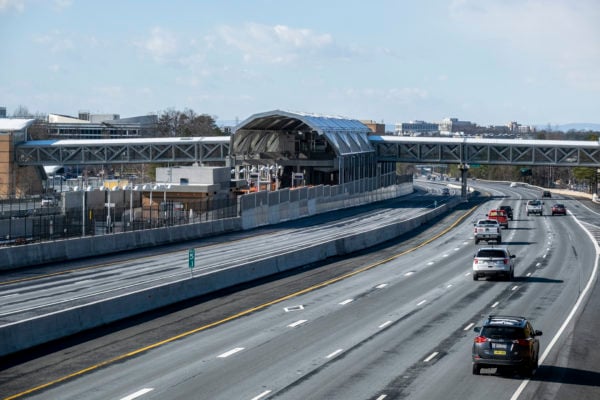
If Metro’s board of directors adopts the proposed Fiscal Year 2022 approved by its finance and capital committee yesterday (Thursday), the start of service on the second phase of the Silver Line will officially be delayed until next year.
The $4.7 billion operating and capital budget moves the start date for Silver Line Phase 2 from July 1, 2021 — as stated in the FY 2021 operating budget — to January 2022 at the earliest, citing the Metropolitan Washington Airport Authority’s expectation that it will be ready to hand over the project to Metro by Labor Day.
The budget also defers an additional $43.1 million subsidy contribution to the project until FY 2023, though $20 million will still be included in FY 2022 “to mitigate Silver Line Phase 2 service equity impacts,” according to the budget summary.
“We are preparing to welcome back customers as part of a return to normalcy, and welcome new customers who have long awaited the convenience of the Silver Line and new stations serving their communities and workplaces,” Metro General Manager and CEO Paul J. Wiedefeld said. “I am especially looking forward to beginning rail service to Dulles Airport as people resume travel to and from the nation’s capital as one of the great destinations in this country.”
Metro and MWAA officials stated as recently as January that construction on the second phase of the Silver Line, which will extend the transit system from Reston into Loudoun County, would be finished this spring, putting it on track to potentially start service in the fall of 2021.
However, the project continues to be plagued by construction issues that need to be resolved before the Metropolitan Washington Area Transit Authority will take over and begin testing.
In addition to delaying funding for the Silver Line, the proposed budget keeps rail and bus service at their current service levels, which are, respectively, at 80 and 85% of their pre-pandemic service levels.
Significant service and personnel cuts that were previously on the table have been averted, thanks to the infusion of $722.9 million in federal COVID-19 relief funds. That includes $193.4 million from the American Rescue Plan Act (ARPA) enacted by Congress in March.
“The impact of the pandemic on ridership and revenue forced us to consider drastic cuts that would have been necessary absent federal relief funding,” Metro Board Chair Paul Smedberg said. “Thankfully, the American Rescue Plan Act has provided a lifeline for Metro to serve customers and support the region’s economic recovery.”
Hunter Mill District Supervisor Walter Alcorn expressed relief that the federal relief funds will save Metro from making the proposed cuts, which could have included the closure of 19 existing rail stations and three unopened ones on the Silver Line.
“While the WMATA board is working to finalize the FY2022 budget, the Silver Line Phase 2 will now open whenever it is ready and because of the federal funds all Metrorail stations will stay open,” Alcorn said in a statement to Reston Now.
WMATA says it received more than 22,400 responses during the public comment period on the FY 2022 budget, which lasted from Feb. 20 to March 16. That is the most comments the transit agency has gotten on a budget proposal in the past 10 years.
WMATA’s board of directors is scheduled to give final approval to the proposed FY 2022 budget on April 22. The fiscal year will begin on July 1 and last until June 30, 2022.
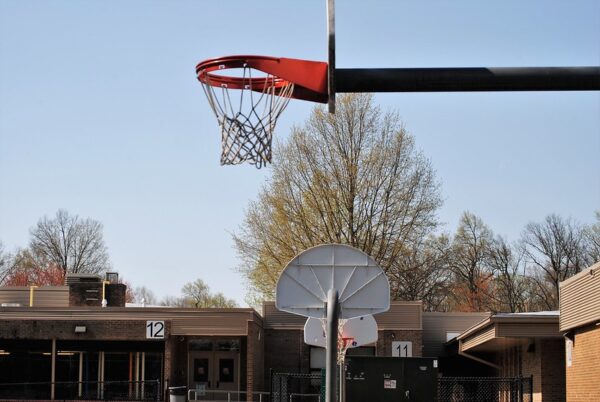
Marijuana Possession Will Soon Be Legal in Virginia — “The Virginia General Assembly agreed Wednesday to make it legal for adults to possess up to an ounce of marijuana on July 1, nearly three years sooner than had been approved by the legislature in February.” [The Washington Post]
County Residents Share Thoughts on Police Chief Search — Fairfax County Board of Supervisors Chairman Jeff McKay and Lee District Supervisor Rodney Lusk hosted a public input session on Tuesday (April 6) as part of the county’s ongoing search for a permanent successor to retired Police Chief Edwin Roessler Jr. McKay said the board will hold interviews for the position over the next week. [WTOP]
Reston Delegate Holds Post-Session Town Hall — After the Virginia General Assembly adjourned yesterday, Del. Ken Plum and State Sen. Janet Howell are holding a virtual town hall meeting at 7 p.m. today to discuss the 2021 session. Anyone interested in attending can register in advance for the Zoom link and submit questions to [email protected]. [Ken Plum]
Metro General Manager Calls Silver Line Phase 2 “A Priority” — Metro General Manager Paul Wiedefeld declined to commit to a “hard start date” for when the Silver Line’s second phase will open, but he told the Northern Virginia Transportation Alliance yesterday “want to get that out as quick as we can” because of the potential impact on ridership and the region’s economic development. [WTOP]
Democratic Candidates for Governor Spar in First Televised Debate — Five candidates vying for the Democratic Party’s nomination to become Virignia’s next governor discussed the pandemic, gun violence, and criminal justice reform during an hour-long event hosted by Virginia State University in Petersburg. [Virginia Mercury]
Reston Company Lands Billions in Defense Contracts — “On the heels of an $830 million U.S. Army contract won in February, Reston-based Science Applications International Corp. (SAIC) has landed two more Army contracts worth a combined $4.4 billion, it announced today.” [Virginia Business]
Photo via vantagehill/Flickr

(Updated at 4:40 p.m.) The Metropolitan Washington Airports Authority is confident enough in the pace of construction on the second phase of Metro’s Silver Line that the project’s leader plans to retire on Independence Day — two months before the agency anticipates finishing its work.
MWAA Senior Vice President Charles Stark has announced that he will retire on July 4, Dulles Corridor Metrorail Project spokesperson Marcia McAllister confirmed to Reston Now. The Washington Post first reported the news yesterday (Monday).
Now 72 years old, Stark has served as executive director of the Dulles Corridor Metrorail Project since August 2014, overseeing the ambitious but oft-delayed 11.4-mile extension of Metro’s Silver Line from Reston to Ashburn through the Washington Dulles International Airport.
McAllister says Stark has decided to retire this summer, because construction on the rail line is now “99 percent complete,” and the project will soon be “moving toward testing which will lead to transfer of the project to WMATA.”
MWAA announced earlier this month that it expects the Silver Line to be ready for the Washington Metropolitan Area Transit Authority to take over by Labor Day in early September.
“We are confident that team is in place to make that happen,” MWAA reiterated in a new statement.
Silver Line phase two will add six stations to the transit system, including one at Reston Town Center and two in the Herndon area. The project has been plagued by construction issues since work began in 2014.
Budget challenges stemming from depressed ridership during the COVID-19 pandemic also had Metro raising the idea of keeping some of the new Silver Line stations closed even after starting operations, presumably next year, though a new wave of federal relief will likely avert that possibility.
WMATA says it has no concerns about Stark’s impending retirement affecting the Silver Line project.
“We look forward to continuing to work with MWAA towards resolution of the remaining issues and acceptance of the project,” Metro spokesperson Ian Janetta said.
MWAA CEO Jack Potter commended Stark for his “leadership in bringing this large, complex project to this stage.
“We wish him all the best in his mid-summer retirement,” Potter said.
Photo by Chuck Samuelson/Dulles Corridor Metrorail Project
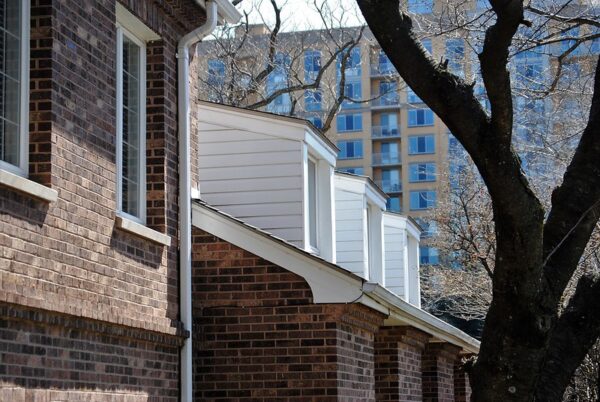
D.C. Cherry Blossoms Reach Peak Bloom — The National Park Service designated yesterday as the peak bloom date for the Tidal Basin cherry blossoms after well-above-average temperatures last week sped up the flowers’ bloom cycle. Peak bloom is defined as the day when 70 percent of the blossoms are open. [NPS]
Colvin Run Mill Restoration Complete — Fairfax County has finished replacing the wheel and flume at Colvin Run Mill. The renovation is part of a larger, ongoing effort to restore the Great Falls park. [@fairfaxtv16/Twitter]
Metro Inspector General’s Report Details Silver Line Issues — A new report from WMATA’s inspector general contains allegations of sexual harassment, alcohol abuse, and the use of fake badges by Metro employees. The report also identified defects in concrete panels installed at stations in Metro’s Silver Line phase two project. [WUSA9]
Reston Company Loses Intellectual Property Lawsuit — A Colorado jury decided against the cybersecurity company TRUSTID, which is owned by the Reston-based Neustar Inc. TRUSTID has filed two lawsuits against Next Caller, alleging that the company misappropriated trade secrets, breached an agreement, and ‘intentionally interfered with a TRUSTID’s business relationship.’ [Virtual Strategy Magazine]
Photo via vantagehill/flickr

Silver Line Phase 2 to Open January 2022 At the Earliest — “During a Thursday briefing, before the Metro Board’s Safety and Operations Committee, Laura Mason, vice president of capital delivery for the Washington Metropolitan Area Transit Authority, said at least 10 Silver Line construction items remain unresolved before Metro will be satisfied with the work by the Metropolitan Washington Airports Authority and its contractor.” [WTOP]
New Fairfax County General Registrar Appointed — “The Fairfax County Electoral Board appointed Scott O. Konopasek as the county’s new general registrar and director of elections at its March 11, 2021, meeting. He will lead the Fairfax County Office of Elections following the retirement of the current registrar Gary Scott who has worked in the office for the past 24 years. Konopasek’s tentative starting date is April 19.” [Fairfax County Government]
Reston Contractor Working with Space Force — The Reston-based contractor SAIC is working with the U.S. Space Force to develop a virtual reality training platform that lets workers “interact with full-scale digital replicas of national security satellites. The platform lets the armed forces practice responding to missile warning scenarios and collaborate in cyberspace.” [The Washington Post]
Comscore Closes Investment Transactions — Reston-based media measurement and analytics company Comscore Inc. announced Thursday that it has secured $204 million in cash investments from the companies Charter Communications Inc., Qurate Retail Inc., and an affiliate of New York-based Cerberus Capital Management LP. The investments came in exchange for shares of convertible preferred stock, and proceeds were used to retire Comscore’s debts. [Virginia Business]
Photo via vantagehill/Flickr
Silver Line Extension Could Open Early Next Year — Phase two of the Silver Line is expected to open in early 2022, according to Metro’s general manager. The announcement comes after the Metropolitan Washington Airports Authority said it will be ready to turn the project over to Metro by Labor Day weekend. [WJLA]
County Hires Health Care Support — The county is hiring substitute and relief counselors as part of its efforts to combat the COVID-19 pandemic and administer vaccines. [Fairfax County Government]
More Solar Panels Coming to County Schools — The Fairfax County School Board voted to install solar panels on a number of school buildings in order to limit greenhouse gas emissions and improve efficiency. The school system plans to begin the project at three schools and eventually phase out to 87 sites. [Fairfax County Public Schools]
Public Hearings on Metro Budget Begin — A number of budget hearings begins this week. Metro is facing a major budget shortfall due to a dip in ridership. [Washington Metropolitan Area Transit Authority]
Northam Reflects on One Year of COVID-19 — Families, friends and neighbors are mourning the more than 9,000 Virginians who died in the coronavirus pandemic over the past year, Gov. Ralph Northam said Sunday in a video. Many others have lost jobs, income, a sense of security and knowing what would happen next as lockdowns and the virus turned life upside down. [Reston Patch]
Photo via vantagehill/Flickr
Updated at 4:30 pm — By Labor Day weekend, the Metropolitan Washington Airports Authority will be ready to handoff the second phase of the Silver Line project to the Washington Metropolitan Area Transit Authority.
Today’s announcement comes after nearly a year of delays for the project, which adds new stations from Reston to Loudoun County. Major construction issues, including the quality of concrete panels, caused significant concerns in recent months.
But now Charles Stark, senior Vice President of the Dulles Corridor Metrorail Project, said major progress has been made.
“Recent progress on outstanding issues has put us in a position to establish a target date for substantial completion and will enable Metro to solidify its plans for final testing, training and starting passenger service.” Stark wrote in a statement.
But a spokeswoman for Metro cautioned that Merro will ultimately determine if it will accept the project.
“Today’s announcement enables Metro to begin planning and budgeting for the start of service in early 2022. As MWAA achieves substantial completion, Metro will be testing, conducting system safety certification, and recruiting and training employees to get ready for passenger service,” wrote Metro General Manager/CEO Paul J. Wiedefeld
The project is currently being managed by the Metropolitan Washington Airports Authority. Phase two extends the line to Loudoun County and includes six new stations and a rail maintenance facility.
This comes as Metro considers closing down three of the newly-opened stations early next year due to drastic budget cuts and dips in ridership.
Metro’s Board of Directors is still proceeding as if the Silver Line Phase II will open this year, but a public survey is asking riders to weigh in on drastic service cuts, including closing the newly-opened Phase II stations in Janurary 22.
Last week, Metro announced that the public comment period for its 2022 fiscal year budget has officially opened.
As part of that, they’re asking riders to fill out a survey about what extreme service cuts they’d be willing to tolerate beginning on Jan. 1, 2022 if additional federal money is not available.
In these options is a question about the closing of 22 stations across the entire system, including two Silver Line stations – McLean and Greensboro – and three potentially newly-opened Silver Line Phase II stations – Innovation Station, Loudoun Gateway, and Reston Town Center.
Although the 2021 budget says that Phase II could open July 1, 2021, it could be delayed until, at the earliest, the fall.
At last week’s budget work session, an tentative estimate was noted as early November.
A Metro spokesperson tells Reston Now there’s “no clear answer yet” about an opening date, however the Metro Board has to proceed as if it will open in 2021 in order to pass the 2022 budget.
“The Board will take all public feedback into consideration before approving a final budget for FY22,” writes the spokesperson.
So, it is possible that the Silver Line Phase II could open this year, only for the stations to close a few months later due to the budget shortfall.
Complicating the situation is that Silver Line Phase II and the proposed drastic service cuts are essentially on two different timelines.
Earlier this month, Metro’s staff presented an update on 18 different safety and operational issues previously noted in December.
Of those 18, 17 were still in the midst of being resolved or remained unresolved. They range from maintenance issues with the station platform pavers to several thousand damaged track fasteners that need replacing to cracked third rail insulators.
The Metro spokesperson confirms that resolving these safety and operational issues have a greater impact on the timeline for the opening of the Silver Line Phase II than the budget shortfall in 2022.
In fact, Metro’s funding for Phase II construction hasn’t really been impacted by Metro’s overall financial woes.
“The Metro board has not done anything to delay the opening of Phase II as a matter of Metro policy or budget policy,”Metro Board of Supervisors member Matt Letourneau told Reston Now in January. “Thus far the position of the Metro board has been whenever the project is…. deemed acceptable and safe, and gone through testing, we should open it.”
That’s not to say that the Silver Line Phase II won’t cost Metro money that needs to be accounted for in the 2022 budget.
At last week’s work session, it was noted that operating costs for Phase II are about $120 million annually, or $10 million a month.
If it is delayed to November 2021 due to safety and operational issues, that would save Metro about $40 million.
However, retention costs like security and ongoing maintenance are $28.5 million annually or about $2.38 million a month — even if the stations and trains are not running and operational.
In the end, if Silver Line Phase II does not open in early November and gets delayed until additional federal funding does come through, it could save Metro about $7.5 million a month.
Metro is continuing to plan the 2022 budget under the prospect that they will not receive additional federal funding, though.
The most recent coronavirus relief package provided Metro more than $600 million in federal funds. That funding, notes Metro, helped avoid layoffs and provide essential services.
But even with that funding and other austerity measures, “there is not enough money to fill the entire budget gap for the fiscal year that begins July 1, 2021,” Metro’s press release reads.
Hence, the potential need to close 22 stations, including the possibly-just-opened Silver Line Phase II stations.
Among the other options for service cuts asked in the survey is closing Metrorail every day at 9 p.m. and trains arriving only every 30 minutes at most stations.
Metro is asking riders to fill out the survey by Tuesday, March 16 at 5 p.m.
There’s a decent chance, however, that these worries over closing stations on Jan 1, 2022 could become moot.
President Biden’s $1.9 trillion stimulus plan has $20 billion earmarked for public transit agencies.
At this time, however, it remains unclear how much would go to Metro if the plan does pass in Congress.
Photo courtesy Metropolitan Washington Airports Authority
A new audit from the Washington Metrorail Safety Commission has found a dozen items that Metro needs to correct as soon as possible and before the opening of Silver Line Phase 2.
Many of the items are related to the lack of guidance and training for employees on a new structural inspection manual. Additionally, the audit also says Metrorail does not review contracted inspectors’ credentials or qualifications thoroughly enough.
In all, how Metro currently handles structural inspections creates “the risk that safety issues could be misidentified or slip through the cracks.”
Another issue is that Metrorail has yet to provide load ratings for its elevated structures, meaning it’s unclear the size and weight limit of trains and equipment that can safely traverse a bridge or station. This creates a risk that the structures “could be inadvertently overloaded,” according to the audit.
The audit makes the conclusion that all of these issues “demonstrates a separate significant, ongoing problem facing Metrorail: siloed departments that do not fully coordinate on work instructions, materials or procedures.”
All aspects of Metro are audited over a three-year cycle, but the structural inspection process was audited now “due to other othersight work that identified concerns,” a WMSC spokesperson tells Reston Now.
Metrorail has 45 days to submit corrective action plans for the issues to the safety commission.
Beyond that, the timeline isn’t clear of when these required changes will actually take place.
The WMSC spokesperson also tells Reston Now that while some of these items are “relatively straight forward” others, like proper training, could take more time.
When reached for comment, a Metro spokesperson wrote Reston Now via email that they are addressing the issues:
Metro appreciates the efforts of the WMSC in completing this audit, especially the acknowledgement of the substantial progress that Metro has made with our structural assessment and maintenance programs. We require inspection of bridges and related structures at least every two years, more frequently in some instances, to ensure structural integrity and the safety of the riding public.
In addition to inspection and maintenance programs, Metro is investing in an aggressive capital program to ensure the state of good repair of our elevated structures, including addressing priority projects. As we review the findings of this audit and develop our responses, we remain committed to continuous improvement of our program and enhancing the safety of the system.
All of this has left the status and timeline of Silver Line Phase 2, which includes the opening of Reston Town Center Station, Herndon Station, and four other stations extending into Northern Virginia, up in the air.
Over the last several months, a number of audits and reports have called out Metro and have threatened to delay the openings.
In the fall, a WMSC audit reported that Metro’s Rail Operations Control Center is a “toxic workplace” with “racial and sexual comments, harassment, and other unprofessional behavior.”
In September, a report from the Metro’s Office of Inspector General found 342 cracks in concrete panels at a number of Silver Lane Phase 2 stations. This was due to the use of faulty materials, read the report.
As of last month, Phase 2 could still open by the fall this year, but that’s at the earliest.
Reston Now followed up with the Metro spokesperson about an updated timeline for the opening of Silver Line Phase 2, but has yet to receive an answer as of publication.
Photo courtesy of Metropolitan Washington Airports Authority


